|
|
|
Sort Order |
|
|
|
Items / Page
|
|
|
|
|
|
|
| Srl | Item |
| 1 |
ID:
145875
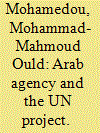

|
|
|
|
|
| Summary/Abstract |
Discussion of the contemporary Arab state system overlooks the engagement of the nascent League of Arab States with the debates about world politics and the purposes of the UN system emerging from World War II. The early experience of that body did not articulate a full expression of universalism, and the integrative cooperation of the Arab League was confined to a limited security policy framework. It did not subsequently seek lastingly to influence the nature of those ideas and institutions that would come to shape the United Nations. The Arab League was also never wedded to a Global Southern logic. Yet the UN has seldom been disavowed in the League’s diplomatic processes, which have been used by member states tactically as a conduit to maximise regional interpretations of the challenges from global order and as a forum for advancing the sub-region’s provincial interests.
|
|
|
|
|
|
|
|
|
|
|
|
|
|
|
|
| 2 |
ID:
145878
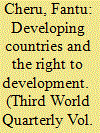

|
|
|
|
|
| Summary/Abstract |
The end of World War II, and the establishment of the United Nations in 1945, unleashed great expectations of a brave new world, in which the promotion and protection of human rights would become the central organising principle of international relations. This article examines the long struggle that African countries, joined by other developing countries, have waged at the UN for a New International Economic Order (NIEO) and for the right to development to be recognised as legally enforceable and universal. To date, however, the right to development has not entered the practical realm of planning and implementation at the national and international levels. The article assesses the internal and external factors that have prevented countries in the Global South from fulfilling the rights of their citizens to development and from moving the agenda forward.
|
|
|
|
|
|
|
|
|
|
|
|
|
|
|
|
| 3 |
ID:
145879
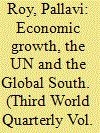

|
|
|
|
|
| Summary/Abstract |
The most visible success of the UN system has been to foster a multilateral structure of international governance that has proved resilient since World War II. However, this structure has failed to provide a financing mechanism to help developing countries achieve the structural transformations required for broad-based economic growth. Indeed, the Global South has also had many chances to reorder the international financing system but has failed thus far to do so. The global distribution of power remains with the USA and the West; even rising China plays by the contract-enforcement rules of the North in terms of global economic governance. Another critical reason why financing has not been readily available, despite the magnitude of capital flows between developed and developing economies, is that it comes with conditions that induce little ‘effort’ to result in capability development. Policies should be devised to overcome this weakness but they are unlikely within a multilateral framework. However, if the USA and China agree to work together on alternative multilateral systems promoted by the Global South, the potential for positive change increases.
|
|
|
|
|
|
|
|
|
|
|
|
|
|
|
|
| 4 |
ID:
145872
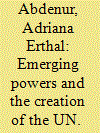

|
|
|
|
|
| Summary/Abstract |
What role did the present emerging powers play in the creation of the United Nations? Drawing on Plutarch’s ‘ship of Theseus’ paradox, this article analyses how, and the extent to which, Brazilian, Chinese and Indian representatives influenced key debates leading up to the UN’s foundation. At the time Brazil was ruled by a fascist-inspired military regime, yet it had supported Allied efforts during World War II; China was split among Nationalists and Communists; and India was still a British colony. These national delegations reflected the main social and political struggles of their respective countries. While these three countries were able to influence the design, procedures and substance of the burgeoning organisation, their agency was limited by their primary focus on internal issues. By comparison, in the present era they have been able to extend their influence in global governance debates by coordinating certain reformist positions.
|
|
|
|
|
|
|
|
|
|
|
|
|
|
|
|
| 5 |
ID:
145871
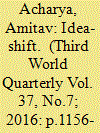

|
|
|
|
|
| Summary/Abstract |
An ‘idea-shift’ is taking place that may be of greater consequence for global governance than is the ongoing ‘power shift’ or the rise of new powers. A number of non-Western thinkers and practitioners - who may be called idea-shifters - have contributed to new concepts and approaches that have radically altered the way we think about development, security and ecology, among other areas. Their ideas are often dismissed or downgraded in the West as imitation, or the product of the Western education of their creators, or of partnership with Western collaborators, governments, donor agencies and multilateral institutions dominated by the Western powers. Challenging this view, this essay holds that ideas from the postcolonial world, its thinkers and policymakers have played an important role in the making of the postwar norms of governance, such as universal sovereignty, human rights, international development and regionalism. Moreover, some of the important recent ideas about development (human development from Mahbub ul Haq and Amartya Sen), security (responsible sovereignty from Francis Deng and colleagues) and ecology (sustainable development from Wangari Maathai) have come from people who, while trained in the West, are deeply influenced by their local context or point of origin. Appreciating how much this local origin and context matters allows us to consider these as ‘ideas-from-below’ and a powerful driver of the unfolding global idea-shift.
|
|
|
|
|
|
|
|
|
|
|
|
|
|
|
|
| 6 |
ID:
145877
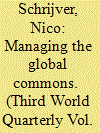

|
|
|
|
|
| Summary/Abstract |
The global commons, comprising the areas and resources beyond the sovereignty of any state, build upon the heritage of Grotius’s idea of mare liberum – an idea that aimed to preserve the freedom of access for the benefit of all. However, the old mare liberum idea digressed into ‘first come, first served’ advantages for industrialised countries. Especially at the initiative of developing countries, it has now been replaced by a new law of international cooperation and protection of natural wealth and resources beyond the limits of national jurisdiction. The global commons have thus served as the laboratory for testing new legal principles and the rights and corollary duties emanating from them. Occasionally path-breaking innovations in regulation have been practised, most notably the imposition of a ban on whaling, penalties for the production and use of ozone-depleting substances and the freezing of claims to sovereignty over Antarctica.
|
|
|
|
|
|
|
|
|
|
|
|
|
|
|
|
| 7 |
ID:
145876
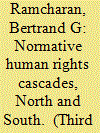

|
|
|
|
|
| Summary/Abstract |
This essay submits that events preceding and leading to the establishment of the United Nations, in the 1940s, saw the emergence of foundational human rights ideas that have shaped the international order ever since. While the major wartime powers were the sponsoring actors, there were strong demands for justice and equality in countries of the South. It was a combination of Northern, Southern and NGO contributions that shaped the content of the normative human rights framework. No country came to this with fully clean hands. The leading powers sought to shield themselves from colonialism, gulags and racial segregation but had to agree to principles and norms that would triumph in the end. Southern representatives, some partly educated in the West but mostly taking their essence from their own soils, argued for high principles and norms, and then many proceeded to violate them once they had gained control of their countries. Many Latin American leaders advanced lofty principles while presiding over exploitative feudal societies at home. The gulf between principles and practice continues in our times, with numerous violations of human rights worldwide.
|
|
|
|
|
|
|
|
|
|
|
|
|
|
|
|
| 8 |
ID:
145873
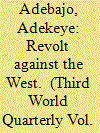

|
|
|
|
|
| Summary/Abstract |
Debates on intervention and sovereignty since 1945 can be summarised as a tale of two cities, San Francisco and Bandung, and of two countries, Rwanda and Libya. All are symbolic of different phases of these debates. The UN was born in San Francisco in 1945 with very little substantive participation by Asian and African governments. The great powers established a system in which they would determine when, where and how military interventions could take place. The 1955 Bandung Conference saw Asian and African countries seek to use new norms of intervention to regain their sovereignty. The 1994 Rwandan genocide, however, forced African countries to dilute notions of absolute sovereignty to allow military interventions for human protection purposes. The 2011 NATO military intervention in Libya did potentially irreparable damage to future UN-mandated interventions and was widely seen in the Global South as an abuse of the responsibility to protect (R2P).
|
|
|
|
|
|
|
|
|
|
|
|
|
|
|
|
| 9 |
ID:
145874


|
|
|
|
|
| Summary/Abstract |
This article analyses the Global South’s role in disarmament. It offers evidence of a customarily ignored Southern agency in UN processes and suggests that the later work of Hans Morgenthau explains both this agency and contrary state policies. The article looks at the recent agreement with Iran as an example of constructive convergence and sets out the structure of an emerging and Southern-supported disarmament initiative.
|
|
|
|
|
|
|
|
|
|
|
|
|
|
|
|
| 10 |
ID:
145870
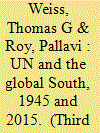

|
|
|
|
|
| Summary/Abstract |
The United Nations is hardly a popular pursuit in today’s academic and policy literatures, and so it is unsurprising that an examination of that multilateral structure before 1945 shows an even more egregious absence of analytical attention. Such ignorance conveniently ignores the forgotten genius of 1942–45, namely in the wide substantive and geographic relevance of multilateralism during World War II and in the foundations for the contemporary world order. This collection of papers critically reviews the worlds of 1945 and 2015, of then and now, to determine the role of continuity and change, of the ongoing bases for compromise, and for the clashes between the Global South and Global North.
|
|
|
|
|
|
|
|
|
|
|
|
|
|
|
|
|
|
|
|
|